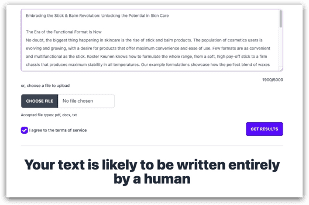The recent drive by many to adopt Machine-Generated Content (MGC) is understandable as it is driven by the desire to cheaply add content to content-hungry websites. However, MGC, or AI generated text, leads to both low-quality content and misses the chief criterion that the Google Search algorithm looks for in website content – authenticity.
Your brand has attributes that the MGC cannot effectively replicate. Remember, the goal of online content is to provide information to visitors to your website:
- to drive decisions
- encourage applications
- raise awareness
To succeed, all of these outcomes require genuine content that provides specific and relevant information.
How Machine Generated Content is Detected is Due to How it Works
MGC is the product of language “scrapes,” which trawl the internet for phrases that appear together frequently and imitates how the pieces are put together to sound human.
The result, however, is often repetitive, vague, or misattributed.
Those are attributes that Google Search algorithm is looking for in its attempts to catch and divert SEO “points” away from pages with MGC. How do Google and other crawlers identify MGC? It is rather easy, actually. As SEO.ai points out in a recent blog post, a sample text block…
…could be identified as AI-generated by Google in several ways:
- The structure of the text is repetitive, with similar phrases and words used multiple times.
- The grammar and syntax are correct but may lack the natural variation and complexity found in human-written text.
- The text may have a high degree of coherence, but lack the nuance and context found in human-written text.
Source: https://seo.ai/blog/can-google-detect-ai-content
Context and Relevance is the Key to Human-Generated Content
It is not enough to say “we sell X”, even if you add a few points of interest about X. You need to make it clear that your product solves their need in your own words. Examples that are context-specific are simply not the province of MGC right now. Your content needs to offer your members/customers/prospects a clear picture of the specific ways:
- Your product is useful to them.
- The composition of the product is unique/effective/relevant.
- You see them taking advantage of the specific attributes of the product.
Better yet, make your case in the words of one of your in-house experts. By quoting or citing an employee you are much more clearly indicating there are humans behind the solution you are describing.
Offer Unique, Human Expertise for the SEO Win
Most guidelines for web content have encouraged limiting complexity. So, the text that MGC is scraping and agglomerating tends to be relatively simple in grade level and structure. The information that the MGC algorithm pulls may be widely sourced, and even provide examples. Doing so gives MGC the appearance of “intellect,” but under scrutiny, the information is often cobbled together and can’t compete with content written by an expert.

Proof of this is in recent blog articles Conotext has written. Our blog articles score over the limit on readability tests due to being written at a higher grade level than has been considered “optimal” based on old thinking around SEO.

However, a check on multiple MGC detector sites finds the content definitely human in origin, based on the context and level of expertise and authenticity provided in our text.
All signs point to the fact that you will serve your audience best by providing relevant information, rather than meeting an arbitrary test of readability. Additionally, MGC language and paragraph structure can be excessively formulaic. Avoid sounding like a bot by creating content that goes against current “readability” guidelines. Instead:
- Utilize longer paragraphs that incorporate more elements than baseline examples.
- Add interest in the form of tangible examples, emotive examples, tactile references, or relevant quotations.
- Use (and quote) internal experts as sources of data and commentary.
- Reference internal work/studies/expertise in context-specific terms to break away from the broad-brush approach that characterizes MGC.
Share Expertise and Authenticity on Your Site to Win Against the Bots
Communication demands context, expertise, and relevant information. These are the elements that make your content useful to your audience and a winner in search — elements that MGC can’t easily imitate. Remember when creating or editing content for the web, SEO success comes from being human and following Conotext’s checklist.
- Subject Matter – Do you address a specific need and provide a relevant answer/solution?
- Page Title and Page Description – Does your page title and description speak to that need?
- Headlines – Do you use H1, H2, and H3 tags in the proper order and highlight the most relevant aspects of your content with them?
- Image Alt Text – Have you provided descriptive text that includes the primary concepts that the images illustrate?
- Call To Action – Do you have a clear call to action that leads to another page on your domain?
- Schema – Have you included organization, product, or article schema to help search engines categorize your content?
Yes, human-generated content costs more in terms of either time or money, but it is worth the investment to develop unique content for your website yourself or with the help of a professional content writer to satisfy your customers’ and potential customers’ need for relevant and useful information.
Digital Marketing Expertise for Financial Institutions
Whether it’s strategy or tactics, or both, Conotext has the knowledge and experience to effectively build a unique plan for your financial institution to engage and acquire customers in today’s digital environment.


